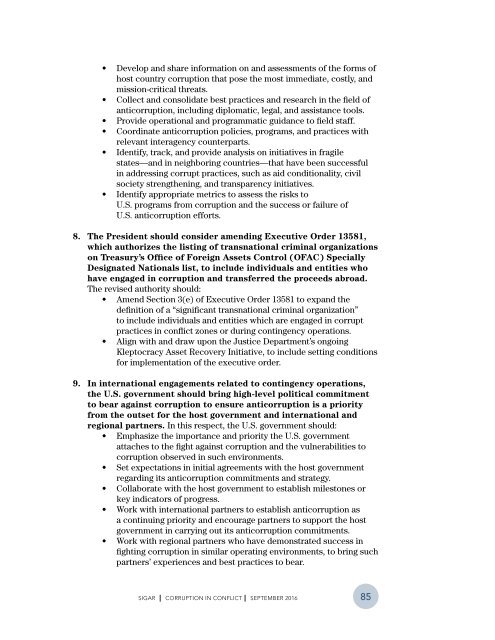CORRUPTION IN CONFLICT
5IlaWjQej
5IlaWjQej
You also want an ePaper? Increase the reach of your titles
YUMPU automatically turns print PDFs into web optimized ePapers that Google loves.
• Develop and share information on and assessments of the forms of<br />
host country corruption that pose the most immediate, costly, and<br />
mission-critical threats.<br />
• Collect and consolidate best practices and research in the field of<br />
anticorruption, including diplomatic, legal, and assistance tools.<br />
• Provide operational and programmatic guidance to field staff.<br />
• Coordinate anticorruption policies, programs, and practices with<br />
relevant interagency counterparts.<br />
• Identify, track, and provide analysis on initiatives in fragile<br />
states—and in neighboring countries—that have been successful<br />
in addressing corrupt practices, such as aid conditionality, civil<br />
society strengthening, and transparency initiatives.<br />
• Identify appropriate metrics to assess the risks to<br />
U.S. programs from corruption and the success or failure of<br />
U.S. anticorruption efforts.<br />
8. The President should consider amending Executive Order 13581,<br />
which authorizes the listing of transnational criminal organizations<br />
on Treasury’s Office of Foreign Assets Control (OFAC) Specially<br />
Designated Nationals list, to include individuals and entities who<br />
have engaged in corruption and transferred the proceeds abroad.<br />
The revised authority should:<br />
• Amend Section 3(e) of Executive Order 13581 to expand the<br />
definition of a “significant transnational criminal organization”<br />
to include individuals and entities which are engaged in corrupt<br />
practices in conflict zones or during contingency operations.<br />
• Align with and draw upon the Justice Department’s ongoing<br />
Kleptocracy Asset Recovery Initiative, to include setting conditions<br />
for implementation of the executive order.<br />
9. In international engagements related to contingency operations,<br />
the U.S. government should bring high-level political commitment<br />
to bear against corruption to ensure anticorruption is a priority<br />
from the outset for the host government and international and<br />
regional partners. In this respect, the U.S. government should:<br />
• Emphasize the importance and priority the U.S. government<br />
attaches to the fight against corruption and the vulnerabilities to<br />
corruption observed in such environments.<br />
• Set expectations in initial agreements with the host government<br />
regarding its anticorruption commitments and strategy.<br />
• Collaborate with the host government to establish milestones or<br />
key indicators of progress.<br />
• Work with international partners to establish anticorruption as<br />
a continuing priority and encourage partners to support the host<br />
government in carrying out its anticorruption commitments.<br />
• Work with regional partners who have demonstrated success in<br />
fighting corruption in similar operating environments, to bring such<br />
partners’ experiences and best practices to bear.<br />
SIGAR I <strong>CORRUPTION</strong> <strong>IN</strong> <strong>CONFLICT</strong> I SEPTEMBER 2016<br />
85


